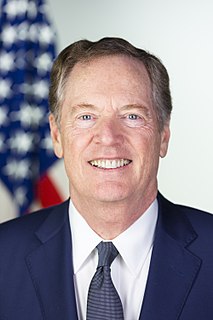A Quote by Thomas Pogge
Competing companies evolve toward efficiency as the more efficient ones profit and expand while those who fall behind fail. And companies being efficient and profiting under the Health Impact Fund, this is exactly what we want, because the company's profit is directly driven by the health impact its registered products achieve.
Related Quotes
Companies are actually much better than governments and other bureaucracies at organizing in a holistically efficient way the extremely complex path from the examination of molecules all the way to the delivery of medicines to patients. Already in the conception and selection of research projects, companies would anticipate all the challenges down the line that they will need to overcome in order to achieve actual health impact. Bureaucratic organizations, by contrast, are notoriously bad at this sort of optimizing.
Today's consumers are eager to become loyal fans of companies that respect purposeful capitalism. They are not opposed to companies making a profit; indeed, they may even be investors in these companies - but at the core, they want more empathic, enlightened corporations that seek a balance between profit and purpose.
If the Health Impact Fund were to be instituted, a single company would be in charge of a medical product all the way from its conception to the health improvements realized by actual patients. The company would be paid for health impact, and it would have to arrange the entire pipeline in between - all the steps of invention, of clinical testing, of getting marketing approval in many different countries, of wholesalers and retailers and prescriptions and so on - in a holistically optimal way.
You can think of the Health Impact Fund as a mechanism that would keep the benefits and burdens of pharmaceutical innovation for the affluent roughly as they are while massively reducing the burdens presently imposed upon the poor. This sounds like magic. But it really works because the current system is not Pareto efficient. It's a system that generates hundreds of billions of dollars in litigation costs and deadweight losses that HIF-registered medicines would sidestep. By avoiding these losses, the HIF reform can bring improvements all around - including for pharmaceutical innovators.
If Canadian companies want to sell products to the E.U., they have to prove those products conform with E.U. product safety, health and environmental rules. This involves extra bureaucracy, controls and paperwork. If the U.K. had a Canada-style deal with the E.U., U.K. companies would have to do the same.
There is more interest in what is occurring in technology companies that impact news. Such companies don't have the same sense of transparency about what they do. They have a tradition of secrecy about products, mores and decision-making that goes along with Silicon Valley and intellectual property and technology. You cannot step onto the grounds of Google without signing a Non-Disclosure Agreement. That industrial secrecy mentality exists along with a theoretical sensibility about transparency on the Web, which is different than transparency inside companies that profit from the Web.
Many entrepreneurs embrace profit-making and charitable purposes. Companies such as shoes seller Toms and eyeglass firm Warby Parker sell products at a profit with a pledge to devote part of their earnings to the needy. The number of for-profit businesses with a built-in charitable dimension has proliferated.
I've obviously come from a health background. I was a doctor before I became a pollie and one of the things I'd like to do is to really build on the world-class health system we've got. I'm passionate about climate change because it's also a health issue. Things like extreme weather impact on people's health, the ability of our hospitals to cope, the impact on mental health, on farmers in regional areas - they're all serious health concerns.
Providing clean, efficient solar/electric generators to industries such as oil companies, spanning from film and event production, construction, disaster relief, agriculture, forestry, and nonprofit organizations. We're literally helping green oil companies, helping them find ways to pollute less while creating jobs. When I look at the breadth of positive impact these technologies can have, I truly get excited. Imagine a generator where ZERO fuel is used!
With the Health Impact Fund, the innovation is paid for separately, through publicly funded health impact rewards, and the product is sold at the cost of production to all. Here, the cruel injustice of preventing the poor from buying at cost - evidenced by today's suppression of the trade in generic versions of patented medicines - would no longer be needed.





































